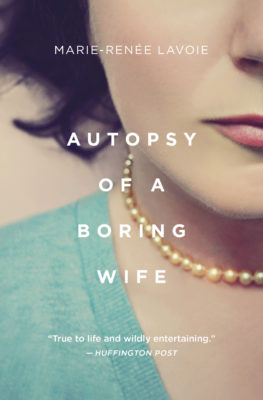What’s the meanest thing someone can say about you? “You’re boring” ranks right up there among the top ten insults. But there’s a big difference between being a boring person and having a boring life.
Diane Delaunais, the main character in Marie-Renée Lavoie’s novel Autopsy of a Boring Wife, is (despite the title) not at all boring. After Jacques, her husband of twenty-five years, unexpectedly leaves her and their empty nest near Quebec City for a younger woman, Diane’s equilibrium (if she ever had any) spirals out of orbit. Trying to regain her footing, she lurches from scene to scene in escapades often featuring her sympathetic friend Claudine.

Autopsy of a Boring Wife
Marie-Renée Lavoie
Translated by Arielle Aaronson
House of Anansi Press
$22.95
paper
280pp
9781487004613
Diane does dig in her heels, in surprising ways that keep the plot moving as fast and furious as her state of mind. She sees a therapist, tries flirting with a colleague, and hires a private investigator who dredges up Jacques’s past and gives her a thick envelope of evidence that suggests the ex-husband may not be so faultless after all. Eventually, Diane starts taking control of her life, and that is the redemptive message of the novel.
Sometimes, the action veers into slapstick. Diane doesn’t overthink, she just acts – emptying a pitcher of ice water on her ex’s new lover. Egged on by Claudine, the two conspire and the result is sometimes ludicrous, undermining Diane’s real anger and emotions expressed elsewhere in the novel.
There’s much to praise in Autopsy of a Boring Wife. The characters are vivid and entertaining, especially Diane and her reckless feistiness. Her emotional trajectory saves the novel from being just another post-break-up tragedy. The scenes and dialogue can be laugh-out-loud funny, and the narrative hums along smoothly, facilitated by the fine translation from French by Arielle Aaronson.
While intelligently written, this is not a deeply intellectual book. Diane is smart, sassy, and she can make you laugh, but she’s conventional. At the risk of overthinking things, Diane might have shown a little more awareness of the privilege inherent in her middle-class life. Yet there’s truth to Diane’s occasional nuggets of insight. After another turbulent episode, she concludes, “That’s the good thing about being boring: the most insignificant little thing becomes a gripping adventure.” mRb






0 Comments